Deck 11: Behind the Supply Curve: Inputs and Costs
Question
Question
Question
Question
Question
Question
Question
Question
Question
Question
Question
Question
Question
Question
Question
Question
Question
Question
Question
Question
Question
Question
Question
Question
Question
Question
Question
Question
Question
Question
Question
Question
Question
Question
Question
Question
Question
Question
Question
Question
Question
Question
Question
Question
Question
Question
Question
Question
Question
Question
Question
Question
Question
Question
Question
Question
Question
Question
Question
Question
Question
Question
Question
Question
Question
Question
Question
Question
Question
Question
Question
Question
Question
Question
Question
Question
Question
Question
Question
Question

Unlock Deck
Sign up to unlock the cards in this deck!
Unlock Deck
Unlock Deck
1/362
Play
Full screen (f)
Deck 11: Behind the Supply Curve: Inputs and Costs
1
In economics, the short run is:
A) less than 1 week.
B) less than 1 month.
C) enough time to vary output but not plant capacity.
D) enough time to change all inputs to production.
A) less than 1 week.
B) less than 1 month.
C) enough time to vary output but not plant capacity.
D) enough time to change all inputs to production.
C
2
Diminishing returns to an input occur:
A) when all inputs are fixed.
B) when some inputs are fixed and some are variable.
C) when all inputs are variable.
D) only when there are no fixed inputs.
A) when all inputs are fixed.
B) when some inputs are fixed and some are variable.
C) when all inputs are variable.
D) only when there are no fixed inputs.
B
3
In economics, the short run is defined as:
A) less than 1 year.
B) less than 6 months.
C) the period in which some inputs are considered to be fixed in quantity.
D) the period in which some inputs are fixed, but it cannot exceed 1 year.
A) less than 1 year.
B) less than 6 months.
C) the period in which some inputs are considered to be fixed in quantity.
D) the period in which some inputs are fixed, but it cannot exceed 1 year.
C
4
Use the following to answer questions: 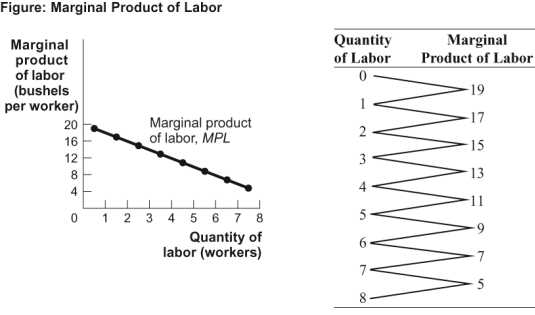
(Figure: Marginal Product of Labor) Look at the figure The Marginal Product of Labor. The total product for three workers is _____ bushels.
A) 51
B) 45
C) 39
D) 15

(Figure: Marginal Product of Labor) Look at the figure The Marginal Product of Labor. The total product for three workers is _____ bushels.
A) 51
B) 45
C) 39
D) 15

Unlock Deck
Unlock for access to all 362 flashcards in this deck.
Unlock Deck
k this deck
5
A _____ is an organization that produces goods or services for sale.
A) production function
B) firm
C) variable input
D) fixed input
A) production function
B) firm
C) variable input
D) fixed input

Unlock Deck
Unlock for access to all 362 flashcards in this deck.
Unlock Deck
k this deck
6
If two firms are identical in all respects except that one has more of the fixed input capital than another, the total product curve for the firm with more capital:
A) must equal the total product curve for the firm with less capital.
B) will lie above the total product curve for the firm with less capital.
C) will lie below the total product curve for the firm with less capital.
D) will show no diminishing marginal returns.
A) must equal the total product curve for the firm with less capital.
B) will lie above the total product curve for the firm with less capital.
C) will lie below the total product curve for the firm with less capital.
D) will show no diminishing marginal returns.

Unlock Deck
Unlock for access to all 362 flashcards in this deck.
Unlock Deck
k this deck
7
The total product curve:
A) shows the relation between output and the quantity of a variable input for varying levels of the fixed input.
B) will become flatter as output increases if there are diminishing returns to the variable input.
C) will be downward-sloping if there are diminishing returns to the variable input.
D) will become horizontal when the marginal product of the variable input is constant.
A) shows the relation between output and the quantity of a variable input for varying levels of the fixed input.
B) will become flatter as output increases if there are diminishing returns to the variable input.
C) will be downward-sloping if there are diminishing returns to the variable input.
D) will become horizontal when the marginal product of the variable input is constant.

Unlock Deck
Unlock for access to all 362 flashcards in this deck.
Unlock Deck
k this deck
8
A fixed input is one:
A) that exists in nature, and there is only so much of it.
B) that can be used for one thing only.
C) that can never produce more or less in any period.
D) whose quantity cannot be changed in the short run.
A) that exists in nature, and there is only so much of it.
B) that can be used for one thing only.
C) that can never produce more or less in any period.
D) whose quantity cannot be changed in the short run.

Unlock Deck
Unlock for access to all 362 flashcards in this deck.
Unlock Deck
k this deck
9
In the short run:
A) all inputs are fixed.
B) all inputs are variable.
C) some inputs are fixed and some inputs are variable.
D) all costs are variable.
A) all inputs are fixed.
B) all inputs are variable.
C) some inputs are fixed and some inputs are variable.
D) all costs are variable.

Unlock Deck
Unlock for access to all 362 flashcards in this deck.
Unlock Deck
k this deck
10
An input whose quantity CANNOT be changed in the short run is:
A) marginal.
B) fixed.
C) incremental.
D) variable.
A) marginal.
B) fixed.
C) incremental.
D) variable.

Unlock Deck
Unlock for access to all 362 flashcards in this deck.
Unlock Deck
k this deck
11
Use the following to answer questions: 
(Figure: Marginal Product of Labor) Look at the figure The Marginal Product of Labor. The total product of labor for eight workers is _____ bushels.
A) 40
B) 35
C) 96
D) 75

(Figure: Marginal Product of Labor) Look at the figure The Marginal Product of Labor. The total product of labor for eight workers is _____ bushels.
A) 40
B) 35
C) 96
D) 75

Unlock Deck
Unlock for access to all 362 flashcards in this deck.
Unlock Deck
k this deck
12
The long run is a planning period:
A) over which a firm can consider all inputs as variable.
B) of at least five years.
C) of more than six months.
D) of 6 months to 5 years.
A) over which a firm can consider all inputs as variable.
B) of at least five years.
C) of more than six months.
D) of 6 months to 5 years.

Unlock Deck
Unlock for access to all 362 flashcards in this deck.
Unlock Deck
k this deck
13
In the long run:
A) all inputs are fixed.
B) inputs are neither variable nor fixed.
C) at least one input is variable and one input is fixed.
D) all inputs are variable.
A) all inputs are fixed.
B) inputs are neither variable nor fixed.
C) at least one input is variable and one input is fixed.
D) all inputs are variable.

Unlock Deck
Unlock for access to all 362 flashcards in this deck.
Unlock Deck
k this deck
14
Lauren has 11 people working in her tangerine grove. The marginal product of the eleventh worker is 13 bushels of tangerines. If she hires a twelfth worker, the marginal product of that worker will be:
A) 14 bushels.
B) 15 bushels.
C) 12 bushels.
D) The answer cannot be determined with the information available.
A) 14 bushels.
B) 15 bushels.
C) 12 bushels.
D) The answer cannot be determined with the information available.

Unlock Deck
Unlock for access to all 362 flashcards in this deck.
Unlock Deck
k this deck
15
Use the following to answer questions: 
(Figure: Marginal Product of Labor) Look at the figure The Marginal Product of Labor. The total product of labor for five workers is _____ bushels.
A) 11
B) 45
C) 55
D) 75

(Figure: Marginal Product of Labor) Look at the figure The Marginal Product of Labor. The total product of labor for five workers is _____ bushels.
A) 11
B) 45
C) 55
D) 75

Unlock Deck
Unlock for access to all 362 flashcards in this deck.
Unlock Deck
k this deck
16
The _____ is the increase in output that is produced when a firm hires an additional worker.
A) average product
B) total product
C) marginal product
D) marginal cost
A) average product
B) total product
C) marginal product
D) marginal cost

Unlock Deck
Unlock for access to all 362 flashcards in this deck.
Unlock Deck
k this deck
17
The term diminishing returns refers to:
A) a falling interest rate that can be expected as one's investment in a single asset increases.
B) a reduction in profits caused by increasing output beyond the optimal point.
C) a decrease in total output due to the firm hiring uneducated workers.
D) a decrease in the extra output due to the use of an additional unit of a variable input when all other inputs are held constant.
A) a falling interest rate that can be expected as one's investment in a single asset increases.
B) a reduction in profits caused by increasing output beyond the optimal point.
C) a decrease in total output due to the firm hiring uneducated workers.
D) a decrease in the extra output due to the use of an additional unit of a variable input when all other inputs are held constant.

Unlock Deck
Unlock for access to all 362 flashcards in this deck.
Unlock Deck
k this deck
18
An input whose quantity can be changed in the short run is a(n) _____ input.
A) marginal
B) fixed
C) incremental
D) variable
A) marginal
B) fixed
C) incremental
D) variable

Unlock Deck
Unlock for access to all 362 flashcards in this deck.
Unlock Deck
k this deck
19
The idea of diminishing returns to an input in production suggests that if a local college adds more custodians, the marginal product of labor for the custodial staff will:
A) increase at an increasing rate.
B) increase at a decreasing rate.
C) decrease.
D) not change.
A) increase at an increasing rate.
B) increase at a decreasing rate.
C) decrease.
D) not change.

Unlock Deck
Unlock for access to all 362 flashcards in this deck.
Unlock Deck
k this deck
20
If two firms are identical in all respects except that one has more of the fixed input capital than another, the marginal product curve for the firm with more capital:
A) must equal the marginal product curve for the firm with less capital.
B) will lie above the marginal product curve for the firm with less capital.
C) will lie below the total marginal curve for the firm with less capital.
D) will show no diminishing marginal returns.
A) must equal the marginal product curve for the firm with less capital.
B) will lie above the marginal product curve for the firm with less capital.
C) will lie below the total marginal curve for the firm with less capital.
D) will show no diminishing marginal returns.

Unlock Deck
Unlock for access to all 362 flashcards in this deck.
Unlock Deck
k this deck
21
Diminishing marginal returns occur when:
A) each additional unit of a variable factor adds more to total output than the previous unit.
B) each additional unit of a variable factor adds less to total output than the previous unit.
C) the marginal product of a variable factor is increasing at a decreasing rate.
D) total product decreases.
A) each additional unit of a variable factor adds more to total output than the previous unit.
B) each additional unit of a variable factor adds less to total output than the previous unit.
C) the marginal product of a variable factor is increasing at a decreasing rate.
D) total product decreases.

Unlock Deck
Unlock for access to all 362 flashcards in this deck.
Unlock Deck
k this deck
22
Use the following to answer questions:
Figure: The Total Product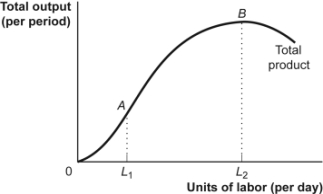
(Figure: The Total Product) Look at the figure The Total Product. For hiring labor between zero and L1:
A) the marginal product of labor is increasing.
B) the marginal product of labor is decreasing.
C) the total product is increasing at a diminishing rate.
D) the total product is decreasing.
Figure: The Total Product

(Figure: The Total Product) Look at the figure The Total Product. For hiring labor between zero and L1:
A) the marginal product of labor is increasing.
B) the marginal product of labor is decreasing.
C) the total product is increasing at a diminishing rate.
D) the total product is decreasing.

Unlock Deck
Unlock for access to all 362 flashcards in this deck.
Unlock Deck
k this deck
23
Use the following to answer questions:
Figure: The Total Product
(Figure: The Total Product) Look at the figure The Total Product. Labor added from L1 and up to L2 is:
A) subject to diminishing marginal returns.
B) adding increasing amounts to total product.
C) adding negative amounts to total product.
D) adding negative amounts to total product and subject to diminishing marginal returns.
Figure: The Total Product

(Figure: The Total Product) Look at the figure The Total Product. Labor added from L1 and up to L2 is:
A) subject to diminishing marginal returns.
B) adding increasing amounts to total product.
C) adding negative amounts to total product.
D) adding negative amounts to total product and subject to diminishing marginal returns.

Unlock Deck
Unlock for access to all 362 flashcards in this deck.
Unlock Deck
k this deck
24
When Caroline's dress factory hires two workers, the total product is 50 dresses. When she hires three workers, total product is 60, and when she hires four workers, total product is 65. The slope of the marginal product curve when two to four workers are hired is:
A) upward.
B) horizontal.
C) vertical.
D) downward.
A) upward.
B) horizontal.
C) vertical.
D) downward.

Unlock Deck
Unlock for access to all 362 flashcards in this deck.
Unlock Deck
k this deck
25
A farm can produce 1,000 bushels of wheat per year with two workers and 1,300 bushels of wheat per year with three workers. The marginal product of the third worker is _____ bushels.
A) 100
B) 300
C) 1,300
D) 2,300
A) 100
B) 300
C) 1,300
D) 2,300

Unlock Deck
Unlock for access to all 362 flashcards in this deck.
Unlock Deck
k this deck
26
Use the following to answer questions: 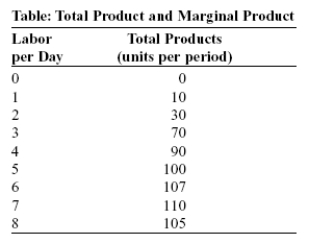
(Table: Total Product and Marginal Product) Look at the table Total Product and Marginal Product. Negative marginal returns begin when the _____ worker is added.
A) fifth
B) sixth
C) seventh
D) eighth

(Table: Total Product and Marginal Product) Look at the table Total Product and Marginal Product. Negative marginal returns begin when the _____ worker is added.
A) fifth
B) sixth
C) seventh
D) eighth

Unlock Deck
Unlock for access to all 362 flashcards in this deck.
Unlock Deck
k this deck
27
Use the following to answer questions:
Figure: The Total Product
(Figure: The Total Product) Look at the figure The Total Product. Between points A and B the marginal product of labor is:
A) increasing.
B) zero.
C) falling.
D) infinite.
Figure: The Total Product

(Figure: The Total Product) Look at the figure The Total Product. Between points A and B the marginal product of labor is:
A) increasing.
B) zero.
C) falling.
D) infinite.

Unlock Deck
Unlock for access to all 362 flashcards in this deck.
Unlock Deck
k this deck
28
Use the following to answer questions:
Figure: The Total Product
(Figure: The Total Product) Look at the figure The Total Product. As labor is hired between L1 and L2, the total product is _____ and the marginal product is _____.
A) rising; positive
B) falling; zero
C) rising; negative
D) rising; zero
Figure: The Total Product

(Figure: The Total Product) Look at the figure The Total Product. As labor is hired between L1 and L2, the total product is _____ and the marginal product is _____.
A) rising; positive
B) falling; zero
C) rising; negative
D) rising; zero

Unlock Deck
Unlock for access to all 362 flashcards in this deck.
Unlock Deck
k this deck
29
The _____ curve shows the quantities of output that can be obtained from different quantities of a variable input, assuming other inputs are fixed.
A) total input
B) marginal input
C) total product
D) average total quantity
A) total input
B) marginal input
C) total product
D) average total quantity

Unlock Deck
Unlock for access to all 362 flashcards in this deck.
Unlock Deck
k this deck
30
You own a deli. Which of the following is a decision most likely to be made in the LONG run at your deli?
A) You order more breadsticks.
B) You order more soft drinks for next week.
C) You renovate the second floor of your building to increase the size of the dining room.
D) You advertise for part-time workers.
A) You order more breadsticks.
B) You order more soft drinks for next week.
C) You renovate the second floor of your building to increase the size of the dining room.
D) You advertise for part-time workers.

Unlock Deck
Unlock for access to all 362 flashcards in this deck.
Unlock Deck
k this deck
31
Use the following to answer questions: 
(Table: Total Product and Marginal Product) Look at the table Total Product and Marginal Product. The marginal product of the fourth worker is _____ units.
A) 20
B) 22.5
C) 50
D) 90

(Table: Total Product and Marginal Product) Look at the table Total Product and Marginal Product. The marginal product of the fourth worker is _____ units.
A) 20
B) 22.5
C) 50
D) 90

Unlock Deck
Unlock for access to all 362 flashcards in this deck.
Unlock Deck
k this deck
32
Use the following to answer questions:
Figure: The Total Product
(Figure: The Total Product) Look at the figure The Total Product. After hiring L2 labor and producing at point B on the total product curve, hiring more labor beyond L2 would cause the:
A) marginal product of labor to rise.
B) marginal product of labor to be negative.
C) total product to be negative.
D) total product to be zero.
Figure: The Total Product

(Figure: The Total Product) Look at the figure The Total Product. After hiring L2 labor and producing at point B on the total product curve, hiring more labor beyond L2 would cause the:
A) marginal product of labor to rise.
B) marginal product of labor to be negative.
C) total product to be negative.
D) total product to be zero.

Unlock Deck
Unlock for access to all 362 flashcards in this deck.
Unlock Deck
k this deck
33
Use the following to answer questions:
Figure: The Total Product
(Figure: The Total Product) Look at the figure The Total Product. If the firm hires more than L2 labor, the total product will _____ because the marginal product of labor is _____.
A) decrease; positive
B) increase; positive
C) decrease; negative
D) increase; negative
Figure: The Total Product

(Figure: The Total Product) Look at the figure The Total Product. If the firm hires more than L2 labor, the total product will _____ because the marginal product of labor is _____.
A) decrease; positive
B) increase; positive
C) decrease; negative
D) increase; negative

Unlock Deck
Unlock for access to all 362 flashcards in this deck.
Unlock Deck
k this deck
34
The marginal product of labor is:
A) the change in labor divided by the change in total product.
B) the slope of the total product of labor curve.
C) the change in average product divided by the change in the quantity of labor.
D) the change in output that occurs when capital increases by one unit.
A) the change in labor divided by the change in total product.
B) the slope of the total product of labor curve.
C) the change in average product divided by the change in the quantity of labor.
D) the change in output that occurs when capital increases by one unit.

Unlock Deck
Unlock for access to all 362 flashcards in this deck.
Unlock Deck
k this deck
35
When Caroline's dress factory hires two workers, the total product is 50 dresses. When she hires three workers, total product is 48, and when she hires four workers, total product is 45. The marginal product of the third and fourth workers is:
A) increasing and positive.
B) increasing and negative.
C) decreasing and positive.
D) decreasing and negative.
A) increasing and positive.
B) increasing and negative.
C) decreasing and positive.
D) decreasing and negative.

Unlock Deck
Unlock for access to all 362 flashcards in this deck.
Unlock Deck
k this deck
36
When an additional unit of a variable input adds less to total product than the previous unit, the firm has:
A) increasing returns.
B) diminishing marginal returns.
C) diminishing total returns.
D) diminishing marginal returns and diminishing total returns.
A) increasing returns.
B) diminishing marginal returns.
C) diminishing total returns.
D) diminishing marginal returns and diminishing total returns.

Unlock Deck
Unlock for access to all 362 flashcards in this deck.
Unlock Deck
k this deck
37
Use the following to answer questions:
Figure: The Total Product
(Figure: The Total Product) Look at the figure The Total Product. When L2 labor is hired, the total product is at a _____ and the marginal product of labor is _____.
A) minimum; zero
B) maximum; zero
C) maximum; positive
D) minimum; positive but falling
Figure: The Total Product

(Figure: The Total Product) Look at the figure The Total Product. When L2 labor is hired, the total product is at a _____ and the marginal product of labor is _____.
A) minimum; zero
B) maximum; zero
C) maximum; positive
D) minimum; positive but falling

Unlock Deck
Unlock for access to all 362 flashcards in this deck.
Unlock Deck
k this deck
38
When Caroline's dress factory hires two workers, the total product is 50 dresses. When she hires three workers, total product is 60, and when she hires four workers, total product is 75. The slope of the marginal product curve when two to four workers are hired is:
A) upward.
B) downward.
C) vertical.
D) horizontal.
A) upward.
B) downward.
C) vertical.
D) horizontal.

Unlock Deck
Unlock for access to all 362 flashcards in this deck.
Unlock Deck
k this deck
39
A total product curve indicates the relationship between _____ when all other inputs are fixed.
A) a variable input and price
B) a variable input and variable cost
C) a variable input and output
D) output and price
A) a variable input and price
B) a variable input and variable cost
C) a variable input and output
D) output and price

Unlock Deck
Unlock for access to all 362 flashcards in this deck.
Unlock Deck
k this deck
40
You own a deli. Which of the following is most likely a fixed input at your deli?
A) the dining room
B) the bread used to make sandwiches
C) the tomato sauce used to make soups
D) the employees
A) the dining room
B) the bread used to make sandwiches
C) the tomato sauce used to make soups
D) the employees

Unlock Deck
Unlock for access to all 362 flashcards in this deck.
Unlock Deck
k this deck
41
A planning period during which all of a firm's resources are variable is the _____ run.
A) long
B) fixed
C) short
D) nominal
A) long
B) fixed
C) short
D) nominal

Unlock Deck
Unlock for access to all 362 flashcards in this deck.
Unlock Deck
k this deck
42
The marginal product of labor is all of the following EXCEPT:
A) the change in output resulting from a one-unit change in labor.
B) the slope of the total product curve.
C) positive at some levels of input and possibly negative at others.
D) total product divided by total labor.
A) the change in output resulting from a one-unit change in labor.
B) the slope of the total product curve.
C) positive at some levels of input and possibly negative at others.
D) total product divided by total labor.

Unlock Deck
Unlock for access to all 362 flashcards in this deck.
Unlock Deck
k this deck
43
The marginal product of labor is the change in _____ divided by the change in _____.
A) labor; total product
B) total output; the quantity of labor
C) average output; the quantity of labor
D) total costs; the quantity of labor
A) labor; total product
B) total output; the quantity of labor
C) average output; the quantity of labor
D) total costs; the quantity of labor

Unlock Deck
Unlock for access to all 362 flashcards in this deck.
Unlock Deck
k this deck
44
Use the following to answer questions:
Figure: Change in the Total Product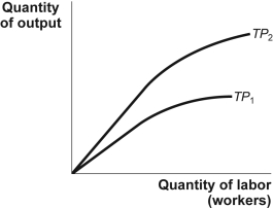
(Figure: Change in the Total Product) Look at the figure Change in the Total Product. As indicated by the change in a production function from TP1 to TP2, the marginal product of labor curve has:
A) shifted upward.
B) shifted downward.
C) not moved.
D) become inverted.
Figure: Change in the Total Product

(Figure: Change in the Total Product) Look at the figure Change in the Total Product. As indicated by the change in a production function from TP1 to TP2, the marginal product of labor curve has:
A) shifted upward.
B) shifted downward.
C) not moved.
D) become inverted.

Unlock Deck
Unlock for access to all 362 flashcards in this deck.
Unlock Deck
k this deck
45
A factor of production whose quantity can be changed during the SHORT run is a(n) _____ factor of production.
A) marginal
B) fixed
C) incremental
D) variable
A) marginal
B) fixed
C) incremental
D) variable

Unlock Deck
Unlock for access to all 362 flashcards in this deck.
Unlock Deck
k this deck
46
A factor of production whose quantity CANNOT be changed during the short run is a(n) _____ factor of production.
A) marginal
B) fixed
C) incremental
D) variable
A) marginal
B) fixed
C) incremental
D) variable

Unlock Deck
Unlock for access to all 362 flashcards in this deck.
Unlock Deck
k this deck
47
As defined in the text, the long run is a planning period:
A) in which a firm can adjust all resources.
B) that is at least five years long.
C) during which the firm must increase sales to stay in business.
D) in which variable resources become fixed.
A) in which a firm can adjust all resources.
B) that is at least five years long.
C) during which the firm must increase sales to stay in business.
D) in which variable resources become fixed.

Unlock Deck
Unlock for access to all 362 flashcards in this deck.
Unlock Deck
k this deck
48
Use the following to answer questions:
Figure: Change in the Total Product
(Figure: Change in the Total Product) Look at the figure Change in the Total Product. Which of the following choices is a likely cause of the shift in production function from TP1 to TP2?
A) Workers in the firm are less productive on average.
B) The firm employed more of a variable input in the short run.
C) Available technology has decreased.
D) The firm employed more of a fixed input in the long run.
Figure: Change in the Total Product

(Figure: Change in the Total Product) Look at the figure Change in the Total Product. Which of the following choices is a likely cause of the shift in production function from TP1 to TP2?
A) Workers in the firm are less productive on average.
B) The firm employed more of a variable input in the short run.
C) Available technology has decreased.
D) The firm employed more of a fixed input in the long run.

Unlock Deck
Unlock for access to all 362 flashcards in this deck.
Unlock Deck
k this deck
49
The long run is:
A) long enough to vary the quantities of all factors of production.
B) long enough to vary all factors of production except for the amount of capital available.
C) more than one month.
D) at least one year.
A) long enough to vary the quantities of all factors of production.
B) long enough to vary all factors of production except for the amount of capital available.
C) more than one month.
D) at least one year.

Unlock Deck
Unlock for access to all 362 flashcards in this deck.
Unlock Deck
k this deck
50
Use the following to answer question:
Figure: The Unknown Curve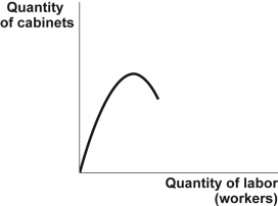
(Figure: The Unknown Curve) Look at the figure The Unknown Curve. You are a cabinetmaker. You employ several workers to produce kitchen and bathroom cabinets. Your summer intern has drawn a graph showing a relationship between the number of cabinetmakers you employ and the number of cabinets produced. Unfortunately, your intern has failed to identify this curve. It is likely to be the _____ curve:
A) total cost
B) total product
C) marginal product
D) total variable cost
Figure: The Unknown Curve

(Figure: The Unknown Curve) Look at the figure The Unknown Curve. You are a cabinetmaker. You employ several workers to produce kitchen and bathroom cabinets. Your summer intern has drawn a graph showing a relationship between the number of cabinetmakers you employ and the number of cabinets produced. Unfortunately, your intern has failed to identify this curve. It is likely to be the _____ curve:
A) total cost
B) total product
C) marginal product
D) total variable cost

Unlock Deck
Unlock for access to all 362 flashcards in this deck.
Unlock Deck
k this deck
51
Diminishing marginal returns means that:
A) each additional unit of an input will decrease output.
B) each additional unit of an input will increase output, but by smaller and smaller amounts.
C) each additional unit of an input will increase output by larger and larger amounts.
D) the firm is maximizing profit.
A) each additional unit of an input will decrease output.
B) each additional unit of an input will increase output, but by smaller and smaller amounts.
C) each additional unit of an input will increase output by larger and larger amounts.
D) the firm is maximizing profit.

Unlock Deck
Unlock for access to all 362 flashcards in this deck.
Unlock Deck
k this deck
52
Use the following to answer questions: 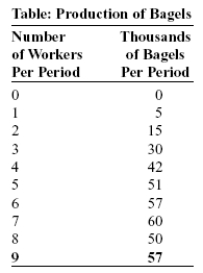
(Table: Production of Bagels) Look at the table Production of Bagels. The marginal product of the fifth worker is _____ bagels.
A) 5,000
B) 9,000
C) 10,000
D) 12,000

(Table: Production of Bagels) Look at the table Production of Bagels. The marginal product of the fifth worker is _____ bagels.
A) 5,000
B) 9,000
C) 10,000
D) 12,000

Unlock Deck
Unlock for access to all 362 flashcards in this deck.
Unlock Deck
k this deck
53
In the long run:
A) the firm has time to change the level of all inputs.
B) inputs are neither variable nor fixed.
C) at least one input is free.
D) all inputs are more expensive.
A) the firm has time to change the level of all inputs.
B) inputs are neither variable nor fixed.
C) at least one input is free.
D) all inputs are more expensive.

Unlock Deck
Unlock for access to all 362 flashcards in this deck.
Unlock Deck
k this deck
54
Think about running a restaurant. Probably:
A) cooks and hosts are variable resources.
B) a building is a variable resource in the short run.
C) cheese and other wholesale food items are fixed resources in the short run.
D) valet parking staff is a fixed resource in the long run.
A) cooks and hosts are variable resources.
B) a building is a variable resource in the short run.
C) cheese and other wholesale food items are fixed resources in the short run.
D) valet parking staff is a fixed resource in the long run.

Unlock Deck
Unlock for access to all 362 flashcards in this deck.
Unlock Deck
k this deck
55
Use the following to answer questions: 
(Table: Production of Bagels) Look at the table Production of Bagels. The marginal product of the third worker is _____ bagels.
A) 9,000
B) 10,000
C) 12,000
D) 15,000

(Table: Production of Bagels) Look at the table Production of Bagels. The marginal product of the third worker is _____ bagels.
A) 9,000
B) 10,000
C) 12,000
D) 15,000

Unlock Deck
Unlock for access to all 362 flashcards in this deck.
Unlock Deck
k this deck
56
A farm can produce 1,000 bushels of wheat per year with two workers or 1,300 bushels of wheat per year with four workers. The marginal product of the fourth worker is _____ bushels.
A) 100
B) 300
C) 1,300
D) 150
A) 100
B) 300
C) 1,300
D) 150

Unlock Deck
Unlock for access to all 362 flashcards in this deck.
Unlock Deck
k this deck
57
Use the following to answer questions: 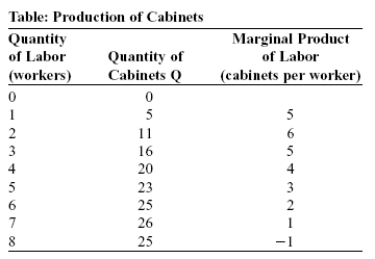
(Table: Production of Cabinets) Look at the table The Production of Cabinets. If each cabinetmaker could be hired at no cost, how many workers would your firm employ?
A) two
B) six
C) seven
D) eight

(Table: Production of Cabinets) Look at the table The Production of Cabinets. If each cabinetmaker could be hired at no cost, how many workers would your firm employ?
A) two
B) six
C) seven
D) eight

Unlock Deck
Unlock for access to all 362 flashcards in this deck.
Unlock Deck
k this deck
58
Use the following to answer questions: 
(Table: Production of Cabinets) Look at the table The Production of Cabinets. After the _____ worker the firm begins to have diminishing returns to labor.
A) first
B) second
C) third
D) fourth

(Table: Production of Cabinets) Look at the table The Production of Cabinets. After the _____ worker the firm begins to have diminishing returns to labor.
A) first
B) second
C) third
D) fourth

Unlock Deck
Unlock for access to all 362 flashcards in this deck.
Unlock Deck
k this deck
59
Assuming that all other factors of production are held constant, marginal product is the change in _____ output resulting from a one-unit change in _____.
A) total; a variable input
B) total; a fixed input
C) total; total product
D) per unit; a fixed input
A) total; a variable input
B) total; a fixed input
C) total; total product
D) per unit; a fixed input

Unlock Deck
Unlock for access to all 362 flashcards in this deck.
Unlock Deck
k this deck
60
Use the following to answer questions: 
(Table: Production of Bagels) Look at the table Production of Bagels. Diminishing marginal returns begin with the addition of the _____ worker.
A) third
B) fourth
C) fifth
D) sixth

(Table: Production of Bagels) Look at the table Production of Bagels. Diminishing marginal returns begin with the addition of the _____ worker.
A) third
B) fourth
C) fifth
D) sixth

Unlock Deck
Unlock for access to all 362 flashcards in this deck.
Unlock Deck
k this deck
61
Suppose that when a coal-mining firm hires one, two, three, four, and five workers, the corresponding total outputs are 10, 15, 19, 22, and 24 tons, respectively. The marginal product of the third worker is _____ tons.
A) 3
B) 4
C) 15
D) 19
A) 3
B) 4
C) 15
D) 19

Unlock Deck
Unlock for access to all 362 flashcards in this deck.
Unlock Deck
k this deck
62
Use the following to answer questions: 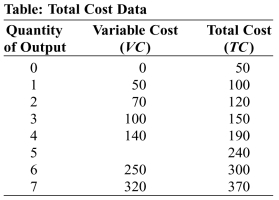
(Table: Total Cost Data) Look at the table Total Cost Data. What is the total variable cost for this bicycle firm when the firm produces 5 bicycles?
A) $50
B) $240
C) $60
D) $190

(Table: Total Cost Data) Look at the table Total Cost Data. What is the total variable cost for this bicycle firm when the firm produces 5 bicycles?
A) $50
B) $240
C) $60
D) $190

Unlock Deck
Unlock for access to all 362 flashcards in this deck.
Unlock Deck
k this deck
63
Use the following to answer questions: 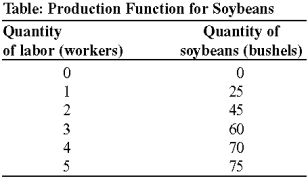
(Table: Production Function for Soybeans) Look at the table Production Function for Soybeans. Assume that the fixed input, capital, is 10 acres of land and a tractor, which have a combined cost of $150 per day. The cost of labor is $100 per worker per day. The fixed cost of producing 25 bushels of soybeans is:
A) $50.
B) $100.
C) $150.
D) $250.

(Table: Production Function for Soybeans) Look at the table Production Function for Soybeans. Assume that the fixed input, capital, is 10 acres of land and a tractor, which have a combined cost of $150 per day. The cost of labor is $100 per worker per day. The fixed cost of producing 25 bushels of soybeans is:
A) $50.
B) $100.
C) $150.
D) $250.

Unlock Deck
Unlock for access to all 362 flashcards in this deck.
Unlock Deck
k this deck
64
Use the following to answer questions: 
(Table: Production Function for Soybeans) Look at the table Production Function for Soybeans. Assume that the fixed input, capital, is 10 acres of land and a tractor, which have a combined cost of $150 per day. The cost of labor is $100 per worker per day. The total cost of producing 45 bushels of soybeans is:
A) $100.
B) $200.
C) $350.
D) $4,500.

(Table: Production Function for Soybeans) Look at the table Production Function for Soybeans. Assume that the fixed input, capital, is 10 acres of land and a tractor, which have a combined cost of $150 per day. The cost of labor is $100 per worker per day. The total cost of producing 45 bushels of soybeans is:
A) $100.
B) $200.
C) $350.
D) $4,500.

Unlock Deck
Unlock for access to all 362 flashcards in this deck.
Unlock Deck
k this deck
65
Use the following to answer questions: 
(Table: Total Cost Data) Look at the table Total Cost Data. What is the total fixed cost for this bicycle firm?
A) $40
B) $50
C) $100
D) $70

(Table: Total Cost Data) Look at the table Total Cost Data. What is the total fixed cost for this bicycle firm?
A) $40
B) $50
C) $100
D) $70

Unlock Deck
Unlock for access to all 362 flashcards in this deck.
Unlock Deck
k this deck
66
A fixed cost:
A) will exist only in the long run.
B) depends on the level of output.
C) can be positive, even if the firm doesn't produce any output in the short run.
D) decreases until the point of diminishing returns is reached.
A) will exist only in the long run.
B) depends on the level of output.
C) can be positive, even if the firm doesn't produce any output in the short run.
D) decreases until the point of diminishing returns is reached.

Unlock Deck
Unlock for access to all 362 flashcards in this deck.
Unlock Deck
k this deck
67
Use the following to answer questions: 
(Table: Production Function for Soybeans) Look at the table Production Function for Soybeans. Assume that the fixed input, capital, is 10 acres of land and a tractor, which have a combined cost of $150 per day. The cost of labor is $100 per worker per day. The variable cost of producing 25 bushels of soybeans is:
A) $50.
B) $100.
C) $150.
D) $250.

(Table: Production Function for Soybeans) Look at the table Production Function for Soybeans. Assume that the fixed input, capital, is 10 acres of land and a tractor, which have a combined cost of $150 per day. The cost of labor is $100 per worker per day. The variable cost of producing 25 bushels of soybeans is:
A) $50.
B) $100.
C) $150.
D) $250.

Unlock Deck
Unlock for access to all 362 flashcards in this deck.
Unlock Deck
k this deck
68
The sum of fixed and variable costs is _____ cost.
A) total
B) marginal
C) variable
D) average
A) total
B) marginal
C) variable
D) average

Unlock Deck
Unlock for access to all 362 flashcards in this deck.
Unlock Deck
k this deck
69
Use the following to answer questions: 
(Table: Production Function for Soybeans) Look at the table Production Function for Soybeans. Assume that the fixed input, capital, is 10 acres of land and a tractor, which have a combined cost of $150 per day. The cost of labor is $100 per worker per day. The variable cost of producing 45 bushels of soybeans is:
A) $100.
B) $200.
C) $350.
D) $4,500.

(Table: Production Function for Soybeans) Look at the table Production Function for Soybeans. Assume that the fixed input, capital, is 10 acres of land and a tractor, which have a combined cost of $150 per day. The cost of labor is $100 per worker per day. The variable cost of producing 45 bushels of soybeans is:
A) $100.
B) $200.
C) $350.
D) $4,500.

Unlock Deck
Unlock for access to all 362 flashcards in this deck.
Unlock Deck
k this deck
70
The long run refers to the period for which:
A) a fixed input exists.
B) all inputs are variable.
C) marginal costs are decreasing.
D) diminishing returns raise marginal cost.
A) a fixed input exists.
B) all inputs are variable.
C) marginal costs are decreasing.
D) diminishing returns raise marginal cost.

Unlock Deck
Unlock for access to all 362 flashcards in this deck.
Unlock Deck
k this deck
71
The total cost curve for a snowmobile dealership shows how _____ cost depends on the quantity of _____.
A) total; fixed inputs
B) average; variable inputs
C) total; output
D) marginal; output
A) total; fixed inputs
B) average; variable inputs
C) total; output
D) marginal; output

Unlock Deck
Unlock for access to all 362 flashcards in this deck.
Unlock Deck
k this deck
72
Use the following to answer questions: 
(Table: Production Function for Soybeans) Look at the table Production Function for Soybeans. Assume that the fixed input, capital, is 10 acres of land and a tractor, which have a combined cost of $150 per day. The cost of labor is $100 per worker per day. The total cost of producing 25 bushels of soybeans is:
A) $50.
B) $100.
C) $150.
D) $250.

(Table: Production Function for Soybeans) Look at the table Production Function for Soybeans. Assume that the fixed input, capital, is 10 acres of land and a tractor, which have a combined cost of $150 per day. The cost of labor is $100 per worker per day. The total cost of producing 25 bushels of soybeans is:
A) $50.
B) $100.
C) $150.
D) $250.

Unlock Deck
Unlock for access to all 362 flashcards in this deck.
Unlock Deck
k this deck
73
Use the following to answer questions: 
(Table: Production Function for Soybeans) Look at the table Production Function for Soybeans. Assume that the fixed input, capital, is 10 acres of land and a tractor, which have a combined cost of $150 per day. The cost of labor is $100 per worker per day. The variable cost of producing 60 bushels of soybeans is:
A) $5.
B) $100.
C) $150.
D) $300.

(Table: Production Function for Soybeans) Look at the table Production Function for Soybeans. Assume that the fixed input, capital, is 10 acres of land and a tractor, which have a combined cost of $150 per day. The cost of labor is $100 per worker per day. The variable cost of producing 60 bushels of soybeans is:
A) $5.
B) $100.
C) $150.
D) $300.

Unlock Deck
Unlock for access to all 362 flashcards in this deck.
Unlock Deck
k this deck
74
Use the following to answer questions: 
(Table: Production Function for Soybeans) Look at the table Production Function for Soybeans. Assume that the fixed input, capital, is 10 acres of land and a tractor, which have a combined cost of $150 per day. The cost of labor is $100 per worker per day. The total cost of producing 70 bushels of soybeans is:
A) $250.
B) $400.
C) $550.
D) $1,024.

(Table: Production Function for Soybeans) Look at the table Production Function for Soybeans. Assume that the fixed input, capital, is 10 acres of land and a tractor, which have a combined cost of $150 per day. The cost of labor is $100 per worker per day. The total cost of producing 70 bushels of soybeans is:
A) $250.
B) $400.
C) $550.
D) $1,024.

Unlock Deck
Unlock for access to all 362 flashcards in this deck.
Unlock Deck
k this deck
75
The costs associated with variable inputs are _____, and the costs associated with _____ inputs are _____.
A) variable; fixed; fixed
B) fixed; fixed; variable
C) variable; fixed; variable
D) fixed; fixed; fixed
A) variable; fixed; fixed
B) fixed; fixed; variable
C) variable; fixed; variable
D) fixed; fixed; fixed

Unlock Deck
Unlock for access to all 362 flashcards in this deck.
Unlock Deck
k this deck
76
Which of the following cost concepts is correctly defined?
A) MC = TC / FC
B) ATC = VC + FC
C) ATC = AVC + AFC
D) TC = AVC + AFC
A) MC = TC / FC
B) ATC = VC + FC
C) ATC = AVC + AFC
D) TC = AVC + AFC

Unlock Deck
Unlock for access to all 362 flashcards in this deck.
Unlock Deck
k this deck
77
A cost that does not depend on the quantity of output produced is:
A) marginal.
B) fixed.
C) variable.
D) average.
A) marginal.
B) fixed.
C) variable.
D) average.

Unlock Deck
Unlock for access to all 362 flashcards in this deck.
Unlock Deck
k this deck
78
Use the following to answer questions: 
(Table: Production Function for Soybeans) Look at the table Production Function for Soybeans. Assume that the fixed input, capital, is 10 acres of land and a tractor, which have a combined cost of $150 per day. The cost of labor is $100 per worker per day. The total cost of producing 60 bushels of soybeans is:
A) $150.
B) $450.
C) $750.
D) $900.

(Table: Production Function for Soybeans) Look at the table Production Function for Soybeans. Assume that the fixed input, capital, is 10 acres of land and a tractor, which have a combined cost of $150 per day. The cost of labor is $100 per worker per day. The total cost of producing 60 bushels of soybeans is:
A) $150.
B) $450.
C) $750.
D) $900.

Unlock Deck
Unlock for access to all 362 flashcards in this deck.
Unlock Deck
k this deck
79
When a firm has diminishing marginal returns:
A) its output is falling.
B) marginal product is falling but is likely to be still positive.
C) total product falls because marginal product is falling and positive.
D) marginal product is always negative.
A) its output is falling.
B) marginal product is falling but is likely to be still positive.
C) total product falls because marginal product is falling and positive.
D) marginal product is always negative.

Unlock Deck
Unlock for access to all 362 flashcards in this deck.
Unlock Deck
k this deck
80
Use the following to answer questions: 
(Table: Production Function for Soybeans) Look at the table Production Function for Soybeans. Assume that the fixed input, capital, is 10 acres of land and a tractor, which have a combined cost of $150 per day. The cost of labor is $100 per worker per day. The total cost of producing 75 bushels of soybeans is:
A) $650.
B) $1,150.
C) $1,225.
D) $7,650.

(Table: Production Function for Soybeans) Look at the table Production Function for Soybeans. Assume that the fixed input, capital, is 10 acres of land and a tractor, which have a combined cost of $150 per day. The cost of labor is $100 per worker per day. The total cost of producing 75 bushels of soybeans is:
A) $650.
B) $1,150.
C) $1,225.
D) $7,650.

Unlock Deck
Unlock for access to all 362 flashcards in this deck.
Unlock Deck
k this deck


